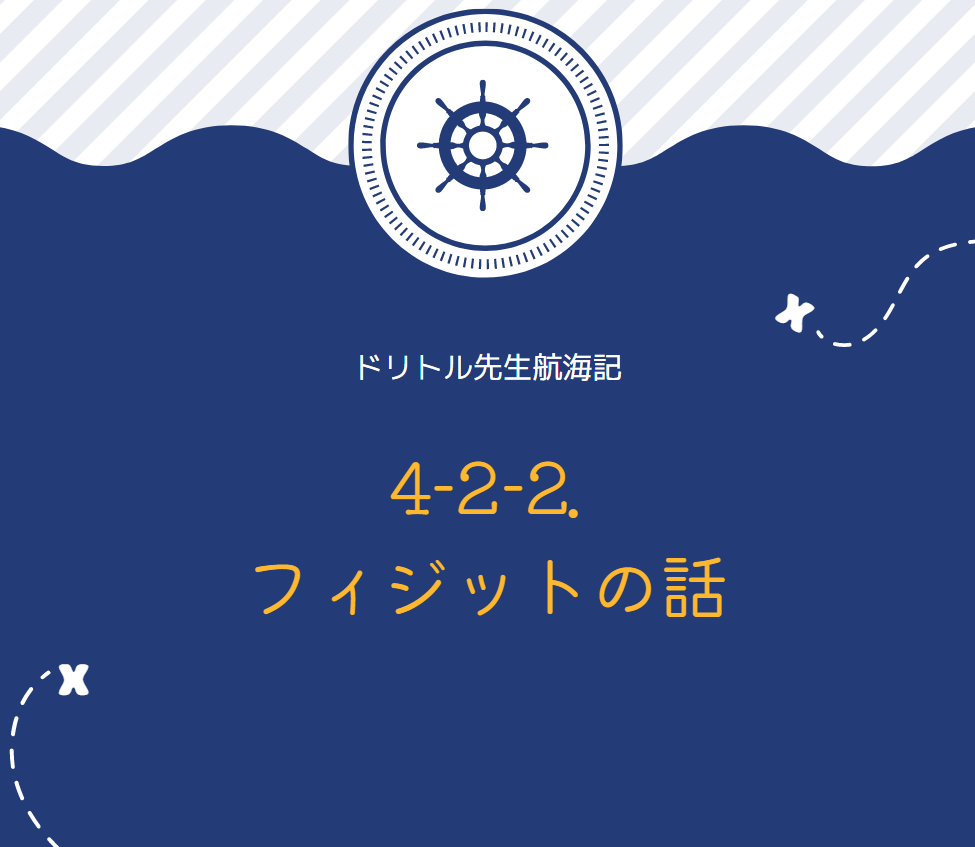『ドリトル先生航海記』英文/和訳【4-2-2.フィジットの話】
※カラフル対訳で紹介している作品はすべてパブリックドメインです。
このサイトで使われている作品のすべては著作権の切れた名作などの全文を電子化して、インターネット上で公開しているProject Gutenberg(プロジェクト・グーテンベルク)、LibriVox(リブリヴォックス、朗読図書館)の作品を出典としています。
翻訳者:satoyayo4080
“Here a couple of old men in whiskers and spectacles leant over[身をのりだす] us, making strange sounds.
「ここでは、ひげを生やし、眼鏡をかけたおじいさんが二人、僕らの上に身を屈め、奇妙な声を立てていました。
Some codling had got caught in[〔わな〕に掛かる] the net the same time as we were.
僕らと同時に小ダラも何匹か網にかかっていました。
These the old men threw back into the sea; but us they seemed to think very precious.[貴重な, 高価な]
おじいさんたちは小ダラは海に投げ返しました。でも、僕らのことはとても大事に思っているようでした。
They put us carefully into a large jar and after they had taken us on shore they went to a big house and changed us from the jar into glass boxes full of water.
僕らを丁寧に大きな瓶の中に入れ、陸の方へつれていくと、大きな建物に行き、瓶から水がいっぱい入っているガラスの箱に入れ替えました。
This house was on the edge of the harbor; and a small stream of sea-water was made to flow through the glass tank so we could breathe properly.
この建物は波止場の端っこにあり、海水の小さな流れがガラスタンクを通って流れるようにされていて、ちゃんと呼吸が出来るようになっていました。
Of course we had never lived inside glass walls before; and at first we kept on trying to swim through them and got our noses awfully sore bumping the glass at full speed.
もちろん、僕らはガラスの壁の中に住むのは初めてで、最初は泳いで通り抜けようとして、全速力でガラスにぶつかって鼻をひどく痛めたものです。
“Then followed weeks and weeks of weary idleness.[遊んでいること, 無為] They treated us well, so far as[(~の)限りでは] they knew how.
それから何週間も何週間も退屈な日々が続きました。彼らは、僕らをできるかぎり大切に扱ってくれました。
The old fellows in spectacles came and looked at us proudly twice a day and saw that we had the proper food to eat, the right amount of light[光量] and that the water was not too hot or too cold.
1日に2回、眼鏡をかけた老人がやってきて、僕らを得意になって眺め、食べ物がふさわしいか、適度な明るさがあるか、水が熱すぎたり冷たすぎたりしないか、といったことを見ていきました。
But oh, the dullness of that life! It seemed we were a kind of a show.
でも、まぁ、その生活のつまらなさといったら。僕らは見世物にすぎませんでした。
At a certain hour every morning the big doors of the house were thrown open[さっと開ける] and everybody in the city who had nothing special to do came in and looked at us.
毎朝決まった時間になると、建物の大きな扉が開け放たれ、特に用のない町の人たちがみんな入ってきて僕らを見ていくのです。
There were other tanks filled with different kinds of fishes all round the walls of the big room.
広い部屋の壁一面には、色々な種類の魚が泳ぐ水槽がありました。
And the crowds[群衆] would go from tank to tank, looking in at us through the glass—with their mouths open, like half-witted[まぬけな] flounders.
そして、人々は水槽から水槽へと移動し、まるで頭の悪いヒラメのように口を開けて、ガラス越しに僕らを見るのです。
We got so sick of it that we used to open our mouths back at them; and this they seemed to think highly comical.
僕らはそのことにとてもうんざりして、僕らもよく口をぽかんと開けて見せてお返しをするのですが、人々は(むしろ)それをとても面白がっているようでした。
“One day my sister said to me, ‘Think you, Brother, that these strange creatures who have captured us can talk?’
ある日、妹が私に言いました。『兄さん、私たちを捕まえたこの奇妙な生き物たちは、話すことが出来ると思う?』
“‘Surely,’ said I, ‘have you not noticed that some talk with the lips only, some with the whole face, and yet others discourse[話す] with the hands?
『もちろんだよ』と私は言いました。『唇だけで話すのもいるし、顔全体で話すのもいる。手まねで会話をしているのもいるよ。気づかなかったのかい?
When they come quite close to the glass you can hear them. Listen!’
彼らがガラスのすぐそばに近づいたらその声が聞こえるよ。聞いてごらん!』
“At that moment a female, larger than the rest, pressed her nose up against the glass, pointed at me and said to her young behind her, ‘Oh, look, here’s a queer one!’
「その時、他の人より大きなある女性が、ガラスに鼻を押し付け、私を指さして彼女の後ろにいる子供に言いました『おや、ご覧。変てこなのがいるよ!』」
“And then we noticed that they nearly always said this when they looked in.
「そうして僕たちは、人間たちは覗き込むたびに大抵いつもそう言っていることに気づいたのです。
And for a long time we thought that such was the whole extent of the language, this being a people of but few ideas.
そして僕たちは、長い間、この人々はあまり考えを持っておらず、この言葉が全部だと考えていました。
To help pass away the weary[退屈な, あきさせる] hours we learned it by heart, ‘Oh, look, here’s a queer one!’ But we never got to know what it meant.
退屈な時間を紛らわすために、僕らは『ほら、見て。変なのがいるよ!』という言葉を暗記しました。でも、それが何を意味するのかは、知る由もありませんでした。
Other phrases, however, we did get the meaning of; and we even learned to read a little in man-talk.
しかし、他のフレーズについては意味を理解することができました。人間の会話も少しぐらいは読み取ることができるようになりました。
Many big signs there were, set up upon the walls; and when we saw that the keepers[番人, 看守] stopped the people from spitting and smoking,
壁には、大きな標語がたくさん掛けられていました。人々が唾を吐【く】いたり煙草を吸っているのを管理人が止める時、
pointed to these signs angrily and read them out loud, we knew then that these writings signified,[~を意味する] No Smoking and Don’t Spit.
怒りながらこれらの標識を指さして読み上げていたので、この標語は『禁煙』『唾を吐くな』を意味していると分かりました。
“Then in the evenings, after the crowd had gone, the same aged male with one leg of wood, swept up the peanut-shells with a broom every night.
「そして夕方、人々がいなくなった後、片足が木の義足で同じ年恰好のおじさんが毎晩、箒(ほうき)でピーナッツの殻を掃除しました。
And while he was so doing he always whistled the same tune to himself.
掃除をしながら、彼はいつも同じ曲の口笛を吹いていました。
This melody we rather liked; and we learned that too by heart—thinking it was part of the language.
このメロディーも僕たちはちょっと好きになって、それも覚えてしまいました。言葉の一部だと思ったのです。

